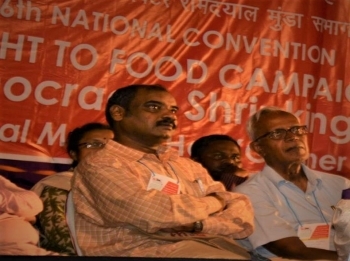
.jpg) Irudhaya Jothi
Irudhaya Jothi

When I was a young boy in the late 1970s, there were well-attended meetings in my village. The meeting was addressed by Jesuit priests under a huge Tamarind tree in Front of the Parish church. The Village’s name is Nangathur some 160 Kilometres from Chennai, the Capital of Tamil Nadu, India.
One of the Jesuits was Fr. Stan Swamy who then was the director of Indian Social Institute (ISI) Bangalore and the other was Fr. Cloud D’Suza from All India Catholic University Federation (AICUF), Loyola College Chennai.
The meeting was to address some of the pressing issues of the Dalit community of both Christians and Hindus in and around the villages in Villupuram District of Tamil Nadu.
The educated and employed men and women of the village expressed dissatisfaction with the treatment meted out by the Priests who were from dominant castes in the Parish and for some trivial matters the priests punished the Catholics by closing the Church and not officiating any sacraments for around six months. The villagers went to the Jesuits for help and that is how Fr. Stan landed there from Bangalore.
When one of such meetings was going on, a man named Narasimhan from a neighbouring village, Kalyanampoondi, came running and requested help from the gathering. He was a Dalit bonded labourer.
Narasimhan narrated to the gathering that he was tied to a tree and was beaten by the landlord for some small mistake. The young man of around thirty was working for the landlord as a bonded labourer from a very young age.
The villagers narrated, that due to poverty, the landless Dalits in the village used to work under the dominant caste landowners as bonded labourers and the children also used to join their parents so that they get their daily food, which is gruel poured into their hands. Sadly they were never given plates and tumblers.
As the children grew up, they grazed goats and cows. When they learne the work in the field, they were counted as labourers under the bond and they never managed to come out free.
Narasimhan’s punishment and his courage to get support from the neighbouring educated villagers brought in their much-needed liberation.
Along with the leaders from Nangathur, Fr. Stan Swamy walked into the neighbouring village of Kalyanampoondi and had a long meeting with the landlords.
At the end of the meeting, it was decided that the bonds will be returned and the labourers will be left free once they pay the meagre amount they were bonded for.
The villagers released from their bonds were free to go to the neighbouring towns and cities to work as liberated free men and women.
Recently when I visited the village, many of the villagers narrated the stories of their misery as bonded labourers and also about these meetings and how they got freedom.
One of the villagers shared one such creative and bold exercise to fight the caste oppression in that village.
As per the custom in that village, the Dalits were not allowed to smoke in front of the dominant caste people. In order to challenge this practice the leaders took many Dalit men and gave them cigarettes and they walked around the village smocking while the dominant caste people looked in frustration.
The Dalit who went out of the towns and cities educated their children, built pukka houses and bought four-wheelers and two-wheelers and some of them purchased the land in which they were once labourers and now they own them.
Thanks to Stan Swamy and educated leaders who had started a people’s movement under the name of Peoples Multipurpose Development(PMD)Society which still works for the people in that area.
The General Congregation 32 of the Society of Jesus which ended in 1975, came out with a decree which was revolutionary for many Jesuits. It said that solidarity with the poor is our priority.
The poor were defined as Dalit, Adivasis, Indigenous people, Minorities, vulnerable women and children, migrants and refugees.
Fr. Stan showed a certain amount of ‘Apostolic Aggressivity’ which the Jesuit Generals were demanding from their members and committed totally to the mission of liberation.
Fr. Stan worked among the Dalits for 16 years and later 35 years with the Adivasis. Fr. Stan used effectively the Social Analysis tool to liberate the confused minds and it lead them into action on behalf of the exploited and oppressed.
Today Christians specially the clergy and religious have become mute spectators to all the violations of human rights and assaults on the vulnerable poor who are most of the time the Dalits, Adivasis, Indigenous people, women and children.
The all-out ‘wholesale’ of natural resources and public sectors to the cronies and a few business houses of the powerful rulers is silently witnessed by the church. It is a sin to be silent before this injustice.
Some wish to see Fr. Stan as a Saint; keeping his picture framed and incensed at the altar or bust projected at the entrance of the institutions do not make us prophetic like Stan! How many of us are ready to walk the extra mile and walk the talk?
On a few occasions when I had a chance to speak with Fr. Stan and narrated how he had been my inspiration from my childhood, he used to shy away from the topic but used to listen and support my work among the Dalit and Adivasis. We miss you Fr. Stan.
(Irudhaya Jothi SJ, Dalit and Adivasi Rights worker and Right To Food Activist)